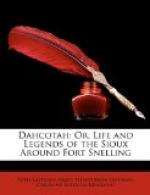CHAPTER II.
Wabashaw’s village is sometimes called Keusca. This word signifies to break through, or set aside; it was given in consequence of an incident which occurred some time ago, in the village.
“Sacred Wind” was a daughter of one of the most powerful families among the Dahcotahs; for although a chief lives as the meanest of his band, still there is a great difference among the families. The number of a family constitutes its importance; where a family is small, a member of it can be injured with little fear of retaliation; but in a large family there are sure to be found some who will not let an insult pass without revenge. Sacred Wind’s father was living; a stalwart old warrior, slightly bent with the weight of years. Though his face was literally seamed with wrinkles, he could endure fatigue, or face danger, with the youngest and hardiest of the band.
Her mother, a fearfully ugly old creature, still mended mocassins and scolded; bidding fair to keep up both trades for years to come. Then there were tall brothers, braving hardships and danger, as if a Dahcotah was only born to be scalped, or to scalp; uncles, cousins, too, there were, in abundance, so that Sacred Wind did belong to a powerful family.
Now, among the Dahcotahs, a cousin is looked upon as a brother; a girl would as soon think of marrying her grandfather, as a cousin. I mean an ordinary girl, but Sacred Wind was not of that stamp; she was destined to be a heroine. She had many lovers, who wore themselves out playing the flute, to as little purpose as they braided their hair, and painted their faces. Sacred Wind did not love one of them.
Her mother, was always trying to induce her to accept some one of her lovers, urging the advantages of each match; but it would not do. The girl was eighteen years old, and not yet a wife; though most of the Dahcotah women are mothers long before that.
Her friends could not imagine why she did not marry. They were wearied with arguing with her; but not one of them ever suspected the cause of her seeming coldness of heart.
Her grandmother was particularly officious. She could not do as Sacred Wind wished her,—attend to her own affairs, for she had none to attend to; and grandmothers, among the Sioux, are as loving and devoted as they are among white people; consequently, the old lady beset the unfortunate girl, day and night, about her obstinacy.
“Why are you not now the mother of warriors,” she said, “and besides, who will kill game for you when you are old? The ‘Bear,’ has been to the traders; he has bought many things, which he offers your parents for you; marry him and then you will make your old grandmother happy.”
“I will kill myself,” she replied, “if you ask me to marry the Bear. Have you forgotten the Maiden’s rock? I There are more high rocks than one on the banks of the Mississippi, and my heart is as strong as Wenona’s. If you torment me so, to marry the Bear, I will do as she did—in the house of spirits I shall have no more trouble.”




